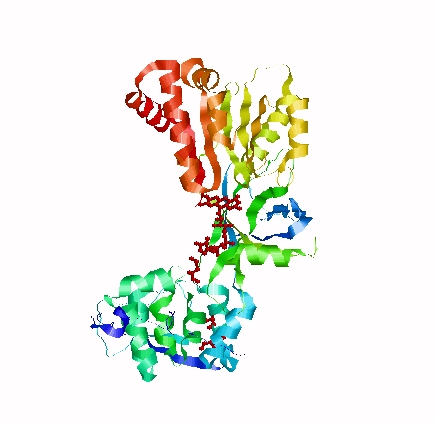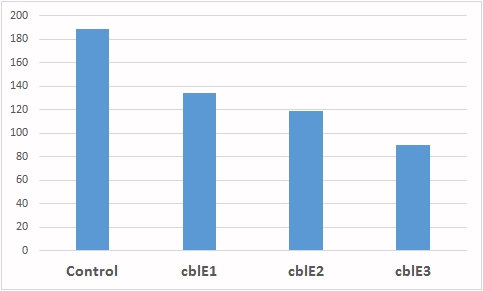Methionine synthase reductase is an FMN/FAD/NADPH dependent enzyme that is involved in the regeneration of oxidized Co(II)B12 to form MethylCo(III)B12. This enzyme is therefore critical in maintaining active MethylCo(III)B12 for use in reduction of homocysteine levels and regeneration of methionine. Thus MTR is involved in two reactions :
Homocysteine + MethylCo(III)B12 + methionine synthase => methionine + *Co(I)B12.
and
5-methyl-tetrahydrofolate + *Co(I)B12 + methionine synthase => tetrahydrofolate + MethylCo(III)B12.
If however, there is no "incoming" 5MTHF, the *Co(I)B12 can be oxidized to the inactive Co(II)B12. In this case the enzyme MTRR regenerates MethylCo(III)B12 by the reaction:
Co(II)B12 + SAM => MethylCo(III)B12 + SAH.
This FAD/FMN dependent enzyme is involved in the re-oxidation of Co(II)-VB12 and conversion to Me-Co(III)-VB12 (Meints etal, 2011; Wolthers and Scrutton, 2009; Olteanu et al,2004; Gherasim etal, 2008). The reaction rate of the enzyme is critically dependent upon the availability of FMN, FAD, NADPH. Thus, if functional vitamin B2 levels are low the rate of reaction of the enzyme drops off dramatically. This is the case for all SNPs and thus FMN/FAD and NADPH have a major role in maintaining active B12. Thus, if functional B2 levels are low, vitamin B12 will become rapidly inactivated and the inactive Co(II)B12 will predominate. This form of B12 will though still be bound by transcobalamin and haptocorrin, so will still be measured as vitamin B12 in both the standard serum B12 assay and the misnamed "active" B12 assay. The inactive Co(II)B12 can predominate in serum or can result from excessive oral B12 administration and is likely to be the predominant form of B12 observed in "Paradoxical B12 deficiency".
The reaction rate also is dependent upon SNPs in the enzyme. It is not known how the activity of the enzyme is altered in many of the SNP alleles, nor is it known what the effect of multiple SNPs have on enzymatic activity.

Methionine Synthase Reductase with vitamin B12
There many different mutations in the MTRR gene, and nearly everyone has one or more, variants of the gene, which may or may not affect the function of the MTRR enzyme. Data on what the effect of the various single nucleotide polymorphisms (SNPs) on enzyme function is rather sparse.
The most highly studied allele is the rs1801394 A>G allele. The homozygous recessive GG condition has been associated with low birth defects, increased risk of oesophageal and stomach cancer in drinkers, increased risk of Spina Bifida and increased risk of colorectal cancer. The functional activity of the enzyme is affected by various SNPs and by riboflavin and vitamin B12 status. In low vitamin B12 the rs1801394 GG allele shows a dramatic drop in activity. The function of the enzyme has been shown to be critically dependent upon riboflavin concentrations (García-Minguillán etal, 2014). The GG allele has been shown to be slightly over-represented in people with CFS (35% observed frequency cf 25% expected frequency).
The GG allele has been shown to have a higher risk of congenital heart disease (AA-26%:AG-32%:GG-42% in patients cf 48:36:16 in controls (Hassan etal, 2017; Zeng etal, 2011), and was also associated with a higher incidence of neural tube defects (Wang etal, 2015), spontaneous abortions (Zhu 2015) and Down Syndrome (Victorino etal, 2014), and spina bifida (van der Linden etal 2006), and an increased risk of some cancers (Han etal 2012).Our studies showed that the GG epitope was negatively associated with the development of ASD, a similar finding to that of Zhang and co-workers (2014) in the Chinese population where it was negatively associated with the risk of developing birth defects. It must be noted, however, that China has the lowest consumption of milk per capita in the world, and as such one would expect that vitamin B2 levels in mothers would be very low. As such genetic varients of vitamin B2 dependent enzymes would be negatively selected against.
The TT allele has been shown to have a higher risk of congenital heart disease (CC-14%:CT-40%:TT-46% in patients cf 38:36:26 in controls (Hassan etal, 2017: Zeng etal, 2011)
Early publications on MTRR, in which the cblE terminology was used showed reduced methylation of down to 50% of normal in cells isolated from patients with various MTRR mutations (Watkins and Rosenblatt, 1988). Effectively this would translate to a vitamin B12 level that was only 50 to 75% of normal optimal levels. The comparative rates methionine synthesis between controls and 3 persons with MTRR mutations (cblE) are graphically presented below. The difference in synthesis rates is much less than that observed for MTR mutations. The experiments though were performed under optimal concentrations of vitamin B2 and B3.

Multiple SNPs in MTRR are seen in children with autism, with the frequency of MTRR A66GG being around 3 times that of the normal population. There is also a much higher frequency of MTRR G12099A GG allele (personal observations).
References
Zeng etal. A66G and C524T polymorphisms of the methionine synthase reductase gene are associated with congenital heart defects in the Chinese Han Population. Genet Mol Res 10: 2597-2605
van der Linden, etal The methionine synthase reductase 66A>G polymorphism is a maternal risk factor for spina bifida. J Mol Med 84: 1047-1054
Han etal Methionine synthase reductase A66G polymorphism contributes to tumor susceptibility: evidence from 35 case-control studies. Mol Biol Rep 2012 39 : 805-816
Meints etal, Tryptophan 697 modulate hydride and inerflavin electron transfer in human methionine synthase reductase. Biochem 2011 27: 11131-42
Wolthers and Scrutton, Cobalamin uptake and reactivation occurs through specific protein interactions in the methionine synthase-methionine synthase reductase complex FEBS J 2009 276: 1942-51
Olteaunu etal, Kinetic and thermodynamic characterization fo the common polymorphic variants of human methionine synthase reductase Biochem. 2004 24: 1988-97
Gherasim etal, Impeded electron transfer from a pathogenic FMN domain mutant of methionine synthase reductase and its responsiveness to flavin supplementation Biochem 2008 47: 12515-22
Garcia-Minguilan etal, Riboflavin status modifies the effects of methylenetetrahydrofolate reductase (MTHFR) and methionine synthase reductase (MTRR) polymorphisms on homocysteine Genes Nutr. 2014 9:435
Copyright © 2018
vitaminb12deficiency.info. All Rights Reserved.
The statements on this site compose a compendium of generally recognized signs
of vitamin B12 deficiency, and problems that can then ensue They also are formulated from a summary of relevant
scientific publications. In addition they may contain some forward looking
statements of a general nature.
Reproduction in whole or in part in any form or medium without express written
permission is prohibited